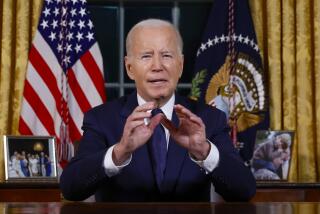Laying U.S. Lives on Line in Bosnia Will Be a Tough Sell : Policy: Clinton has his work cut out for him. Polls show most Americans oppose military intervention.
- Share via
WASHINGTON — As President Clinton prepares to commit U.S. forces to end the bitter civil war in the Balkans or enforce a shaky peace, he will have to try to sell an acutely skeptical public on a policy that could cost American lives.
Clinton and his aides have insisted that no final decision has been made about dispatching U.S. air or ground forces to Bosnia-Herzegovina, but they expressed clear recognition that such a step could be an unavoidable part of the diplomatic process they have set in motion.
Such action would require thorough consultation with Congress and communication with the American people about the policy and the rationale behind it.
Polls show that a majority of the public opposes U.S. military intervention in the Bosnian conflict, presenting Clinton with his most difficult sales job yet. It would also have him making the case on yet another issue far afield from the domestic concerns that got him elected and mean most to voters.
So far, Clinton has kept his distance, delivering no major speeches on the issue and working largely through foreign policy appointees. He has said that he will await the results of Secretary of State Warren Christopher’s mission courting allied support in Europe before he makes a binding decision on the use of force in Bosnia.
“Before I agree to put one American soldier there,” Clinton told reporters Monday at the beginning of a meeting with Hong Kong Gov. Chris Patten, “I will obviously speak not only to you (the media) but directly to the American people about it.”
Clinton has begun to prepare for such a public relations campaign by talking about what he perceives to be the humanitarian and geopolitical stakes for the United States in the Balkan conflict.
“There has been enormous loss of life under especially brutal conditions there, and it is a very politically unstable part of the world which has significant potential for a wider war,” Clinton said.
“And so the United States has tried to work with our allies . . . in an attempt to get the parties together so that we can present a united front and so that we can keep the pressure up to end the killing but also to stop the prospect of a much wider war, which could cause much more trouble, much more instability,” he said.
The sales job facing Clinton on Bosnia is daunting for a number of reasons.
Forging a consensus will be anything but easy, polls show. A poll conducted April 26 by NBC News, for instance, showed that the number of Americans who favor military action had risen from 23% in February to 40% in April. But the share of Americans who disapprove of Clinton’s handling of the Bosnia question had risen too, also from 23% in February to 40% late last month.
Gen. Brent Scowcroft, former President George Bush’s national security adviser, referred to Americans’ uncertainties Monday as he explained on CNN why the Bush team resisted temptations to get involved. “If you look at the polls . . . there is not a great deal of enthusiasm,” Scowcroft said. “People do not understand what the U.S. stake is in Yugoslavia.”
But Clinton’s poll taker, Stanley Greenberg, asserted that the polls would change the moment the U.S. military was committed. In the Persian Gulf War, he said, the share of Americans who opposed the war was rising as the debate unfolded. But as soon as the commitment was made, he said, American support soared for the President and his policy.
Greenberg said that Americans respond well to idealistic arguments for getting into wars. For that reason, Clinton may do best if he contends that U.S. involvement is necessary on humanitarian grounds.
But in trying to sell this cause, Clinton would have problems that are peculiar to him. He was elected largely to wrestle with the country’s domestic difficulties.
And the pitch would come at a time when Clinton is asking Americans to follow him down other difficult paths. He wants them to pay higher taxes and put up with some government service cuts in connection with his economic plan, and he may soon be asking many Americans to pay more and perhaps get less to carry out his health care reforms.
Although the White House has not yet sketched out its public relations strategy, analysts said they believe that it probably would involve an address to a joint session of Congress or a prime-time televised address from the Oval Office.
On Monday, Clinton continued a round of support-seeking calls to congressional leaders. He also plans to convene the bipartisan leadership of both houses of Congress at the White House today to explain his Bosnia policy.
But congressional opinion--like public opinion--is deeply divided. Republicans like Senate Minority Leader Bob Dole (Kan.) and Sen. Richard G. Lugar (Ind.), for example, are strong advocates of the use of force in Bosnia, while Rep. Lee H. Hamilton (D-Ind.), chairman of the House Foreign Relations Committee, is among the most dovish voices on Capitol Hill.
Times staff writer William J. Eaton contributed to this article.
More to Read
Get the L.A. Times Politics newsletter
Deeply reported insights into legislation, politics and policy from Sacramento, Washington and beyond. In your inbox twice per week.
You may occasionally receive promotional content from the Los Angeles Times.









